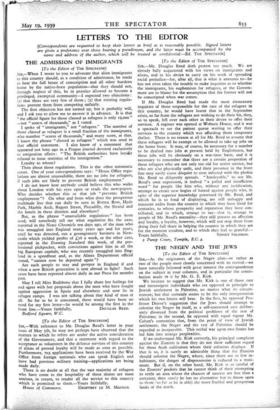[To the Editor of THE SPECTATOR] SIR,—Mr. Douglas Reed doth
protest too much. We are already fully acquainted with his views on immigrants and aliens, and in his desire to carry on his work of spreading racial prejudice—for, after all, that is what it amounts to—he has not even taken the trouble to make inquiries as to whether the immigrants, his euphemism for refugees, or the Govern- ment are to blame for the assumption that the former will not be conscripted when war comes.
If Mr. Douglas Reed had made the most elementary inquiries of those responsible for the care of the refugees in this country, he would have learnt that in the September crisis, so far from the refugees not wishing to do their bit, they, so to speak, fell over each other in their desire to offer their services. A register was opened at Woburn House, and it was a spectacle to see the patient queue waiting to offer their services to the country which was affording them temporary shelter. There is no reason at all for Mr. Reed to assume that these refugees will be exempt or be allowed to take up jobs on the home front. It may, of course, be necessary for a number to be drafted into jobs at present held by Englishmen, but these jobs will be obviously on a war-time basis, and it is necessary to remember that there are a certain proportion of these refugees who are not only too old for active service, but who are also physically unfit, and their presence in the front line may easily cause disquiet to men infected with the phobia Mr. Reed so diligently spreads. "Intolerable," to use Mr. Reed's own expression, is indeed "a pallid and insufficient word" for people like him who, without any justification, attempt to create new bogies of hatred against people who, in spite of the superior knowledge possessed by Mr. Reed, and which he is so fond of displaying, are still unhappy and innocent exiles from the country in which they have lived for centuries, to whose prosperity and reputation they have con- tributed, and to which, strange to say—that is, strange to people of Mr. Reed's mentality—they still possess an affection and loyalty, a loyalty, however, which will not stop them from doing their full share in helping the country in which they are for the moment resident, and to which they feel so grateful.—


















































 Previous page
Previous page